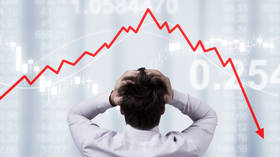European stocks end worst year since 2018

Major European stock indices struggled in 2022, with most showing their worst performance since before the Covid-19 pandemic, CNBC reported on Friday.
The pan-European Stoxx 600 index began the last trading day of the year down more than 12% versus a year ago, its worst yearly drop since a 13.24% plunge in 2018, according to the media outlet.
The French CAC 40 is on pace to register a 12% plunge for the year, while the German DAX is on track to lose 18% in 2022, the worst performance in five years in both cases. The UK’s FTSE 100 has done slightly better, but is still set to lose 2% for the year.
Analysts attribute the poor performance to this year’s geopolitical troubles, in particular the conflict in Ukraine and the subsequent sweeping sanctions against Russia by the West. The resulting global surge in food and energy prices has sent inflation in many countries to multi-decade highs, quickly ushering in a full-blown cost-of-living crisis in Western countries.
Meanwhile, the steps taken globally to stem the surge of inflation, such as interest rate hikes, which many central banks enacted this year, are seen by many as inadequate. Meanwhile, both the rising prices and higher borrowing costs have significantly affected industrial activity, causing many economists to warn of a looming global recession.
The lingering Covid-19 lockdowns in China, which were only recently lifted, also contributed to the uncertainty in stock markets.
Market experts say that the subdued appetite for riskier investments, such as stocks, that was seen throughout most of this year may remain in place in 2023.
“Investors are going into 2023 with a cautious mindset, prepared for more rate hikes, and expecting recessions around the globe. And then there’s China and its U-turn on Covid prevention. It’s been quite the shift from fighting every case to living with the virus and that creates enormous uncertainty for the start of the year,” Craig Erlam, senior market analyst at the forex trading platform OANDA, told Bloomberg.
For more stories on economy & finance visit RT's business section













